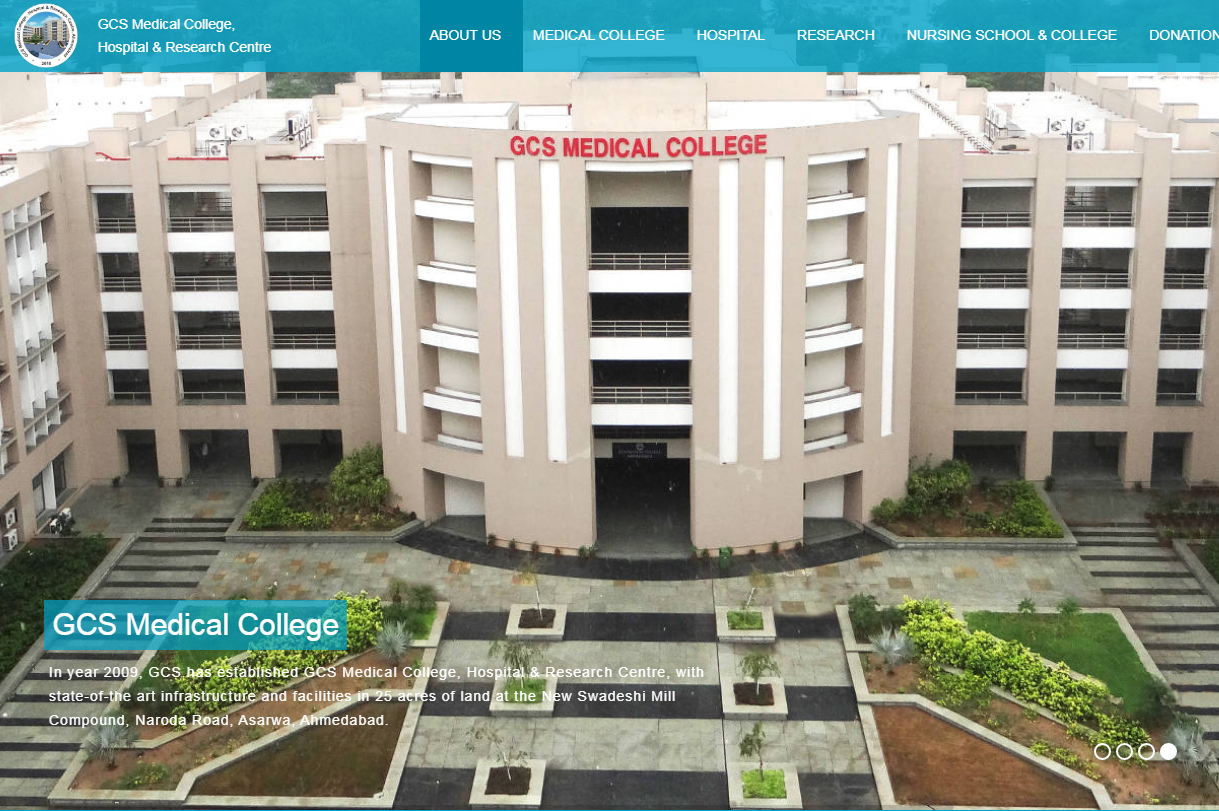
GCS Medical College, Ahmedabad
Gujarat cancer society was founded in 1961 and since then it has been providing care to the patient suffering from cancer at M.P.Shah Cancer Hospital, Civil Hospital Compound, Ahmedabad and Community Oncology Centre (COC), Vasna. Till date, lacs of patients have been diagnosed and treated.
In appreciation of the work undertaken by GCS, the Government of Gujarat has given us the responsibility to develop a new medical college. The Government of Gujarat has given 25 acres of land at the New Swadeshi Mill Compound, Naroda Road, Asarwa, Ahmedabad.
In year 2009, GCS has established GCS Medical College, Hospital & Research Centre, with state-of-the art infrastructure and facilities. Following permission from MCI to start M.B.B.S. course in 2011, 150 medical students were enrolled for the same. Subsequently, on processing renewal permission, another batch of 150 medical students was enrolled in the year 2012
GCS HOSPITAL, MEDICAL COLLEGE & RESEARCH CENTRE
Opp. D. R.M. Office, Nr. Chamunda Bridge, Naroda Road, Ahmedabad-380 025, Gujarat, India
View Map
Telephone : +91-79-6604 8000
Fax : +91-79-2220 1915
Toll Free : 1800-233-4112
Email : info@gcsmc.org
M.B.B.S.

Bachelor of Medicine, Bachelor of Surgery (Latin: Medicinae Baccalaureus, Baccalaureus Chirurgiae; abbreviated in many ways, most commonly MBBS, but also MB ChB, BMBS, MB BCh, MB BChir), is the primary medical degree awarded by medical schools in countries that follow the tradition of the United Kingdom. The historical degree nomenclature states that they are two separate undergraduate degrees. In practice, however, they are usually combined as one and conferred together, and may also be awarded at graduate-level medical schools.
Bachelor of Medicine and Bachelor of Surgery (MBBS), is a professional degree in medical science. A person holding the MBBS degree becomes a certified medical practitioner. The duration of MBBS course is five years and six months including one year of rotational internship at hospitals, health centres, and health camps organised by non-profit organisations (NGOs). MBBS course syllabus includes studies on anatomy, pharmacology, pathology as well as community health & medicine, paediatrics, and surgery. The syllabus, prescribed in such a way that MBBS degree holders can choose a specialisation for further majoring and practising medicine. The career specialisations for MBBS students are Nephrology, Cardiology, Gynecology, Anesthesiology, Organ Transplant, Endocrine, and General Surgery, etc.
MD - Anaesthesiology
The purpose of PG education is to create specialists who would provide high quality health care and advance the cause of science through research & training. A post graduate specialist having undergone the required training in anesthesiology should be able to recognize the health needs of the community. He or she should be competent to handle effectively medical problems and should be aware of the recent advances pertaining to his/her specialty. She/he should be highly competent anesthesiologist with broad range of skills that will enable him/her to practice anesthesiology independently. The PG student should also acquire the basic skills in teaching of medical/para-medical students. She/he is also expected to know the principles of research methodology and modes of consulting library. She/he should attend conferences, workshops and CMEs regularly to upgrade his/her knowledge. The purpose of this document is to provide teachers and learners illustrative guidelines to achieve defined outcomes through learning and assessment. This document was prepared by various subject-content specialists. The Reconciliation Board of the Academic Committee has attempted to render uniformity without compromise to purpose and content of the document. Compromise in purity of syntax has been made in order to preserve the purpose and content. This has necessitated retention of “domains of learning” under the heading “competencies”
MD - Bio-Chemistry
MD - Dermatology , Venereology & Leprosy
MD - Emergency Medicine
MD - Forensic Medicine/Forensic Medicine & Toxicology
MD - General Medicine
MD - Microbiology
MD - Pathology
MD - Pharmacology
MD - Physiology
MD - Psychiatry
M. D. in Psychiatry is a Clinical Speciality course.
Doctor of Medicine in Psychiatry explores the major psychiatric syndromes like psychotic, mood and anxiety disorders, psychological effects of physical diseases, the doctor-patient relationship, human development, patient interviewing, and ethical issues in medicine. It is a three-year postgraduation course and can be pursued by any MBBS holders from a University recognized by Medical council of India. Most psychiatrists practice general psychiatry. Sub-specialization in Child and Adolescent Psychiatry, Addiction Medicine, and Geriatric psychiatry can be conducted after M. D. in Psychiatry.
MD - Radio Diagnosis/Radiology
MD - Social & Preventive Medicine / Community Medicine
MD - Tuberculosis & Respiratory Diseases / Pulmonary Medicine
MD/MS - Anatomy
MD/MS - Obstetrics & Gynaecology
MD/MS - Ophthalmology
MS - ENT
MS - General Surgery
MS - Orthopaedics
- Log in to post comments
- 47 views
